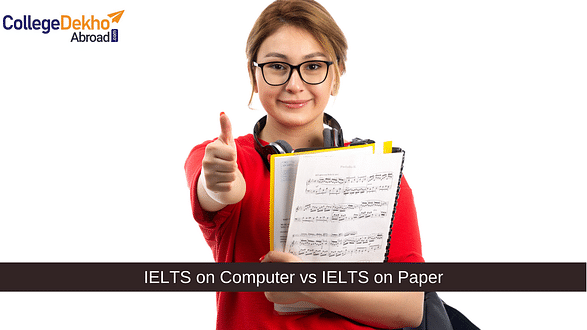IELTS on Computer vs IELTS on Paper: Due to its unquestionable popularity and global recognition, the IELTS has introduced the IELTS computer-based test (IELTS CBT) alongside the IELTS paper-based test (IELTS PBT), making it difficult for test takers to choose between the two. Though both are similar, there are some distinctions between them, and you may be unsure which strategy to employ.
The IELTS on-computer test has the same content as the IELTS on-paper test, but instead of writing your answers on paper, you type them on a computer. The only distinctions are in the order of the tests and the testing environment. In this article, we will discuss the difference between IELTS on computer vs IELTS on paper tests.
IELTS on Computer vs IELTS on Paper Overview
Confused about which one to choose among IELTS on computer vs IELTS on paper? Here is a quick and brief overview of the differences between the two types of IELTS exams for study abroad aspirants:
|
Point of Difference |
IELTS on Computer |
IELTS on Paper |
|---|---|---|
|
Delivery |
|
|
|
Results Availability |
3-5 days |
13 days |
|
Booking and Registration |
Look for a computer icon when booking your IELTS on computer mode exam. |
Look for a paper icon when booking your IELTS on paper mode exam. |
|
Test Availability |
Upto 7 days a week |
Upto 48 days per year (mostly Thursdays and Saturdays of the month) |
|
Length of the Test |
|
|
Now that we have a brief overview of the differences between IELTS on Computer vs IELTS on Paper, let us delve deep into each of these differences in more detail.
Get Your Own IELTS Study Plan for 2023!
Difference Between Computer-Based IELTS and Paper-Based IELTS
It all comes down to personal preference and time constraints. Some people like to write with a pencil, while others prefer to type and click their responses. Here are some fundamental difference factors between IELTS on Computer vs IELTS on Paper, which are explained in depth:
#1 Location
You must be physically present at the registered location assigned to you for both the IELTS paper-based and IELTS computer-based tests. The main difference between them is that paper-based IELTS is administered in a large classroom with 100-150 students, and computer-based IELTS is administered in a small classroom with one candidate per computer.
#2 Format
The Reading and Writing sections of the paper-based IELTS test are administered with a pen and paper. To answer the questions in the computer-delivered IELTS test, you must use the computer desktop. Within the time limit, you must write your responses on the answer sheet. In computer-assisted IELTS, you must input your answers into the provided boxes on your screen.
#3 Assessment
The assessment part differs in both IELTS on computer vs IELTS on paper. In the computer-based IELTS test, the answers are saved on the computer and directly uploaded to the Cambridge server. Whereas in the paper-based IELTS test, the examiner collects the answer sheets in person and sends them to the Cambridge grading centre, which is a more time-consuming process.
#4 Timing
Timings are generally the same for both IELTS on computer vs IELTS on paper methods of administering the test. In the paper test, you will have 10 minutes at the end of the Listening part to transfer your answers to the answer sheet. In the computer-based test, you must type your answers in the spaces provided on the screen. There is time between sections to check your answers, but there is no extra time in the end.
#5 Test Environment
IELTS computer-based tests are administered in smaller, custom-designed test centres, with each test-taker having a computer. IELTS paper-based tests, on the other hand, are held in larger rooms with a greater number of participants. While IDP aims to offer a quiet setting, other test takers may raise their hands to ask questions. Smaller test rooms with fewer test takers boost your chances of being able to focus better; nonetheless, this is a personal preference.
#6 Test Results
One significant difference between IELTS on computer vs IELTS on paper is that with IELTS computer-based testing, you can take the test today and obtain your IELTS results in the following week. IELTS computer test results are normally delivered within 3-5 days, whereas IELTS paper test results are accessible within 13 calendar days.
Now that we have come to know about the key differences between IELTS on computer vs IELTS on paper tests format, you must be wondering which one is an ideal choice for you. To decide which IELTS to give, you first must be aware of all the advantages and disadvantages of IELTS on computer vs IELTS on paper tests!
Advantages & Disadvantages of IELTS on Computers vs IELTS on Paper
Now that we are aware of the salient differences between IELTS on Computer vs IELTS on Paper, here are some of the major advantages and disadvantages of the two formats of the IELTS exam. This will certainly help test-takers to make a better choice between IELTS on Computer vs IELTS on Paper.
Advantages of IELTS on Computer
-
Smaller rooms or settings with fewer aspirants allow for greater attention and less stress.
-
Some centres let you take the exam in the afternoon, morning, or before/after the Speaking test.
-
Results are obtained in as little as 5-7 days.
-
There is no need to count words because the word count for the Writing section is available on the screen.
-
For the Listening section, each candidate should have their own set of headphones. This results in crisper audio and improved attention.
-
When the candidates will have 10 and 5 minutes left in the Reading sections and Writing sections, the timer on the screen will turn red.
-
The candidate need not be concerned about the quality of their handwriting.
-
The applicant can easily modify their content.
-
In the Reading and Listening tests, the candidate can highlight the text using a right-click.
-
It is possible to alter the screen settings, including text colour and size.
-
The volume of the speaker can be easily adjusted.
-
The screen will contain a navigation bar so the applicant may see their progress at the bottom and track the answers they missed.
-
Within the total time restriction, the candidate may evaluate their responses at any time. When users click on the number they want to review, the Navigation Bar is highlighted for their convenience.
-
The candidate can manage their time and move forward or backwards as desired.
-
Their answers will be saved automatically, so they do not have to constantly save or press Enter. They are free to change any answer at any moment.
Disadvantages of IELTS on Computer
-
Some candidates may find it stressful to use the screen for 3 hours.
-
The candidate cannot draw or write in the Writing Task, which may be difficult for some.
-
The candidate will not have an extra 10 minutes following the Listening test to transfer their answers, like in the paper-based approach. They will, however, have more time in between phases and 2 minutes at the end. Some candidates take the extra time to double-check their spelling and answers.
-
The candidate will be required to click and drag or type answers immediately while listening to each section, which may be difficult.
-
At centres, the candidate can hear people typing behind them, which can be a huge distraction. Some IELTS test centres, however, do provide noise-cancelling headphones and quieter keyboards.
-
The candidate may not be accustomed to inputting replies, which may hinder their progress.
-
The candidate must listen and type at the same time, which is difficult for people who are not used to it.
-
There are not many possibilities to practise the test on the computer.
-
Basic computer skills are required, such as scrolling, clicking, navigating, clearing, highlighting, copying and pasting, dragging and typing, and so on.
-
A candidate's time can be wasted if they are unfamiliar with computer shortcuts.
Advantages of IELTS on Paper
-
Many students, particularly in the Writing section of the IELTS paper-based test, will value the ability to write and draw.
-
Students can rapidly circle, underline, and practise words on the answer sheet. This is a common strategy for many candidates, but it is impossible if they take the computer-based IELTS exam.
-
The candidate does not need to have a wide range of fundamental computer skills and can concentrate solely on the task at hand.
-
The candidate does not need to be accustomed to typing responses, as this will not slow them down.
-
At the end of the Listening section, the applicant will be given an additional 10 minutes to transfer their solutions to the answer sheet. This is frequently advantageous for several students.
Disadvantages of IELTS on Paper
-
While writing in a paper-based IELTS test style, the candidate must always keep a word count.
-
The candidate is unable to follow progress, and editing/changing answers is more difficult.
-
Candidate's handwriting may not be legible for IELTS on Paper-checking officials.
-
The act of transferring responses into the answer box is fraught with danger.
-
Examination halls are typically overcrowded, resulting in a lack of concentration.
-
For an IELTS paper-based test format, results take longer to get.
-
In some circumstances, the lack of flexibility is also a significant drawback or disadvantage of IELTS on paper over IELTS on computer.
We now know that if you decide to take the IELTS test online, you will use a computer to complete the Reading, Listening, and Writing sections of the exam which will be taken either just before or right after the Speaking test. On the contrary, you will have to complete the Reading, Listening, and Writing sections on paper if you choose to take IELTS on Paper. One week before or after your test date, you may complete the Speaking test in a face-to-face interview with an IELTS examiner.
We have also seen how the IELTS on Computer test is more advantageous than IELTS on Paper test, but the most important factor is your comfort. Hence, if you are more confident and comfortable with the pen-paper format of the exam then IELTS on Paper is the right fit for you and if you are more comfortable giving your exam online using a desktop (computer) then IELTS on Computer is your cup of tea! Unless and until you are comfortable with the type, no pen, paper, or desktop is more important.
You can also connect with experts at abroad@collegedekho.com to know more about the IELTS exam and accepting universities abroad!
Kickstart Your IELTS Preparation Journey Today!

























